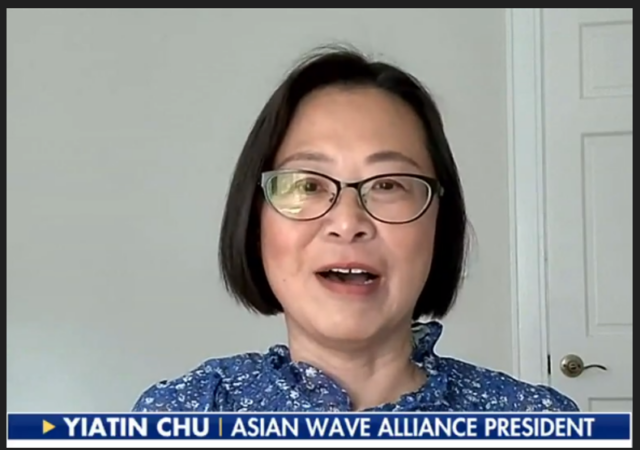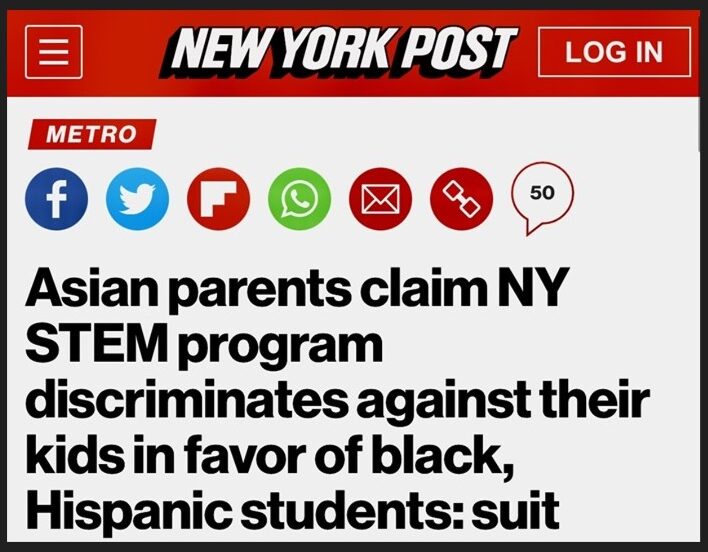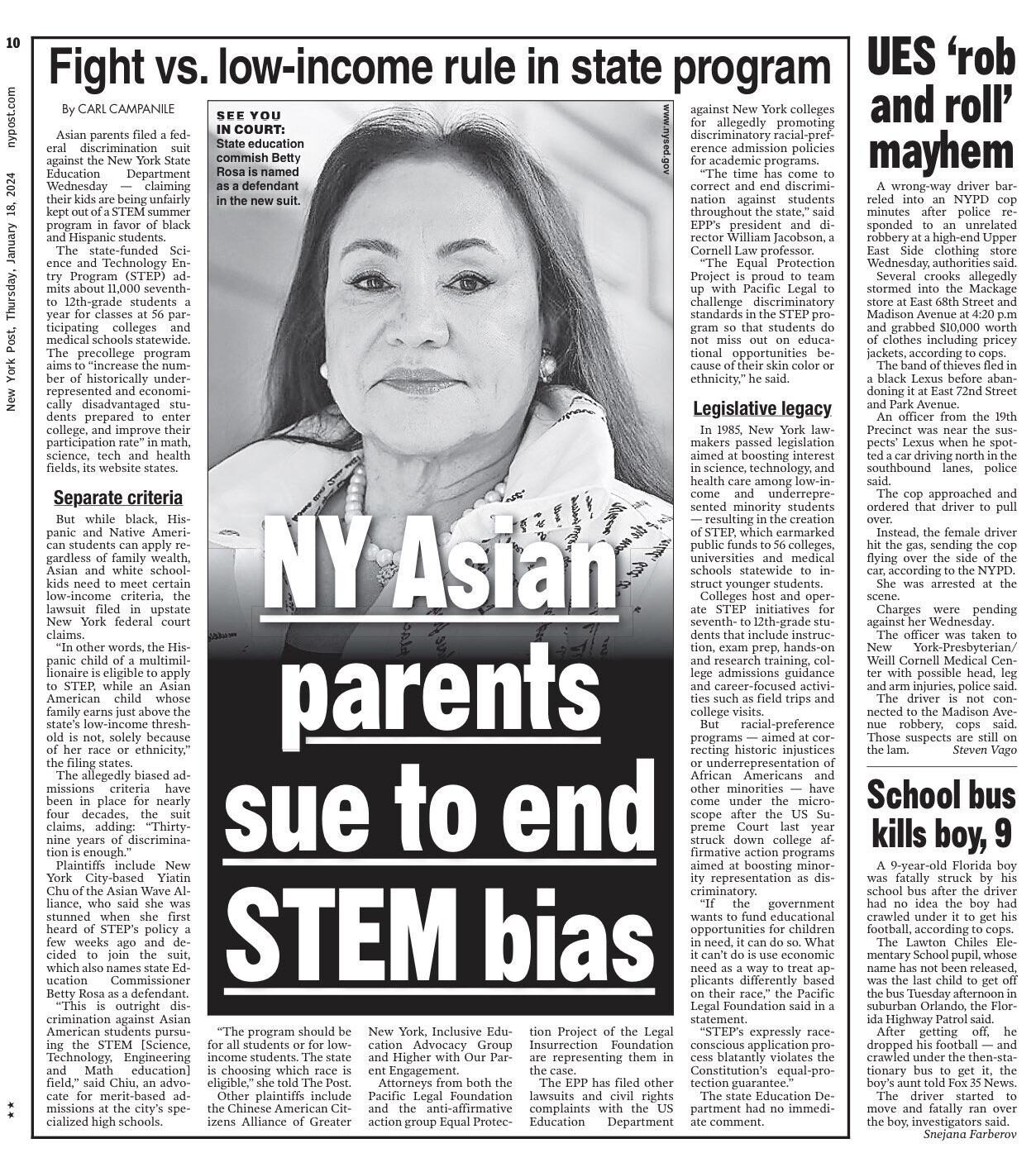Asian Parents Sue NY State Over Discriminatory Student Programs, With Help From Equal Protection Project
Lawsuit seeks to end discrimination affecting over 10,000 secondary school students taking programs at 56 colleges and universities in NY State: “The Equal Protection Project is proud to team up with Pacific Legal to challenge discriminatory standards in the STEP program so that students do not miss out on educational opportunities because of their skin color or ethnicity”

The Equal Protection Project (EPP) (EqualProtect.org) of the Legal Insurrection Foundation has challenged numerous racially discriminatory programs done in the name of Diversity, Equity, and Inclusion. This discrimination comes in various ways, but the overarching theme is to exclude or diminish some people and promote others, based on race, color, or ethnicity. In just our first 10 months of operation, we have had a huge impact.
We have now teamed up with Pacific Legal Foundation to challenge the NY STEP Act, which provides state-funded grants to 56 colleges and universities in NY State for programs in science and technology for middle and high school students. You may recall the Science and Technology Entry Program (“STEP”) Act, as it was at issue in legal challenges EPP filed against the public SUNY Buffalo Jacobs School of Medicine and six private medical schools in NY State. The legal issue was that there were differing standards of eligibility based on race and ethnicity required by state regulation under the STEP Act. As we stated in out Buffalo Medical School complaint:
“The discrimination is apparent: if applicants are black, African American, American Indian, Alaskan Native or Hispanic, they are automatically eligible for the program. Applicants who do not fall into one of those racial and ethnic categories are automatically excluded from consideration unless they can show that they meet the guidelines for being “economically disadvantaged.” The “historically underrepresented minorities” are not required to prove any economic need.”
Those legal challenges were against the schools receiving the funding and administering it in a discriminatory manner. They are liable, we argued, because the schools were not legally obligated to take the funds, so it was no legal excuse that the funding came with discriminatory strings attached.
The STEP Act programming is huge. According to a 2022 legislative report, almost 11,000 middle and high school students participate yearly, with another 6,000 college students under a separate progam not at issue in this lawsuit. (That may be subject to a separate lawsuit in the future.) Fifty-six colleges and universities have STEP programs. This is as systemic as it gets.
Now we are going after the source of the funding and discrimination, the STEP Act itself and implementing regulations of the NY State Education Department, seeking a declaration and injunction against the discriminatory provisions. We don’t seek to stop STEP education funding, we just insist that if NY State is going to do so, it do so on a non-discriminatory basis.
The Complaint (full embed at bottom of post) was filed in federal court in the Northern District of New York, and provides in pertinent part:
1. For thirty-nine years, New York State has funded a racially-discriminatory science enrichment program for middle and high school students. If “[e]liminating racial discrimination means eliminating all of it,” then the time has come for New York to open this opportunity to all students, regardless of race or ethnicity. Students for Fair Admissions v. President and Fellows of Harvard College, 600 U.S. 181, 206 (2023). Thirty-nine years of discrimination is enough.
2. Through the Science and Technology Entry Program (STEP), N.Y. Educ. Law § 6454, New York State funds summer and academic-year programs for 7-12 graders at higher education institutions around the state. These programs give students interested in science, technology, and related fields a head start to achieve their career goals through tutoring, college counseling, test prep, and hands-on lab and research opportunities—all free of charge to the students.
3. However, when it comes to which students are eligible to apply, STEP’s regulations discriminate based on race and ethnicity. Black, Hispanic, Native American, and Alaskan Native student applicants are eligible to apply regardless of their family’s income level. All other student applicants, including Asian and white students, must first prove that their families are economically disadvantaged. In other words, the Hispanic child of a multi-millionaire is eligible to apply to STEP, while an Asian American child whose family earns just above the state’s lowincome threshold is not, solely because of her race or ethnicity.
4. Today, an individual parent and three Asian-American organizations that are devoted to fighting for equal opportunity in education bring this civil rights action to vindicate their equal protection rights under the Fourteenth Amendment to the United States Constitution.
The Complaint details the impact on the plaintiff parents and their children, including a parent whose child previously tried to apply but was excluded:
7. Plaintiff Yiatin Chu is a parent and education advocate living in New York City. Ms. Chu is a co-founder and leader of PLACE NYC and the Asian Wave Alliance, as well as a member of the Chinese American Citizens Alliance of Greater New York. Ms. Chu’s daughter, N.C., is Asian American and a New York State resident. N.C. is enrolled in the seventh grade, is in good academic standing, has an overall GPA above 80, and has above an 80 average in Math, Science, and English. N.C. would like to apply for admission to the summer 2024 STEP program at New York University but cannot because she is subject to additional eligibility requirements because of her race.
***
9. Plaintiff Inclusive Education Advocacy Group (IEAG) is a New York City grassroots parent organization whose mission is to fight discriminatory eligibility and admissions practices that restrict applicants based on race or ethnicity. IEAG believes that state-funded programs like STEP should be open to New York students of all races and ethnicities equally. IEAG has a member whose tenth-grade child attempted to apply for the STEP program at CUNY Baruch College for the summer 2023 STEP program but was ineligible because her race subjected her to additional income requirements. This IEAG member’s eighth-grade child would like to apply to the STEP programs at New York University and CUNY Baruch College for summer 2024 but cannot because he is subject to additional eligibility requirements because of his race. See Redacted Decl., Exhibit B.
***
22. Asian American student applicants, like N.C. and the children of the organizational Plaintiffs’ members, do not meet STEP’s definition of a historically underrepresented minority. 8 NYCRR § 145-6.5(a).
23. Student applicants who are black, Hispanic, Native American, or Alaskan Native are automatically eligible to apply for a STEP opportunity, even if their family’s socioeconomic status is much higher than an Asian American student applicant’s.
24. Because of their race and ethnicity, N.C. and CACAGNY, IEAG, and HOPE members’ children are excluded from consideration for STEP unless they can demonstrate economic disadvantage—a requirement that applicants who are black, Hispanic, Native American, or Alaskan Native are never required to meet.
EPP and Pacific Legal issued a joint press release about the lawsuit, which provides in part:
Today, Pacific Legal Foundation and Legal Insurrection Foundation filed a federal lawsuit today targeting New York’s attempt to racially balance specialized enrollment in New York’s supplemental educational program for science and technology.
New York created the Science and Technology Entry Program (STEP) to provide more opportunities for disadvantaged students. But instead of straightforwardly using socio-economic need for admission, the program includes a racial bias: any black, Hispanic, Native American, or Alaskan native students can qualify. If a student’s parents who barely top the poverty line applied, but they are not part of the designated racial categories, the student is categorically ineligible.
“New York shouldn’t determine who gets the opportunity to attend educational programs based on race,” adds Pacific Legal Foundation attorney Erin Wilcox. “Such race-based decision-making violates the Constitution’s equal protection guarantee and has been shot down at the U.S. Supreme Court numerous times.”
“The Supreme Court has been very clear. In 2007, it stated that ‘the way to stop discriminating on the basis of race is to stop discriminating on the basis of race.’ Then last year, it reaffirmed that racial discrimination in admissions is unacceptable, and ‘eliminating racial discrimination means eliminating all of it.’ All students of all races should have equal rights based on their merit to participate in programs like New York State’s STEP, says Wai Wah Chin, charter president of Chinese American Citizens Alliance of Greater New York, a plaintiff in the case.
“We are committed to requiring the State of New York to live up to its constitutional obligations to treat all students equally, without regard to race or ethnicity,” adds attorney William A. Jacobson, Cornell University law professor and founder of the Equal Protection Project. “There is no good form of racism, and the State of New York needs to stop this discrimination.”
Both EPP and Pacific Legal have set up respective case pages.
CACAGNY also issued a press release:
CACAGNY sues New York State over racial discrimination in its STEP STEM program: pic.twitter.com/ZK8qJs6X36
— Chinese American Citizens Alliance of Greater NY (@CACAGNY) January 17, 2024
I expect there will be substantial media coverage in the coming days. The New York Post was the first to pick up the story:
Asian parents filed a federal discrimination suit against the New York State Education Department Wednesday — claiming their kids are being unfairly kept out of a STEM summer program in favor of black and Hispanic students….
But while black, Hispanic and Native American students can apply regardless of family wealth — Asian and white schoolkids need to meet certain low-income criteria, the lawsuit filed in upstate New York federal court claims.
“In other words, the Hispanic child of a multi-millionaire is eligible to apply to STEP, while an Asian American child whose family earns just above the state’s low- income threshold is not, solely because of her race or ethnicity,” the filing states….
Attorneys from both the Pacific Legal Foundation and the anti-affirmative action group Equal Protection Project of the Legal Insurrection Foundation are representing them in the case.
The EPP has filed other lawsuits and civil rights complaints with the US Education Department against New York colleges for allegedly promoting discriminatory racial-preference admission policies for academic programs.
“The time has come to correct and end discrimination against students throughout the state,” said EPP’s president and director Williams Jacobson, a Cornell Law professor.
The Equal Protection Project (EqualProtect.org) is proud to team up with Pacific Legal to challenge discriminatory standards in the STEP program so that students do not miss out on educational opportunities because of their skin color or ethnicity,” he said.
At EqualProtect.org we go up against some of the most powerful and wealthiest entities in the nation who are practicing DEI discrimination. Your donations are critical to our ability to carry on this battle.
UPDATE:
We received almost a full page in the print version of the NY Post.
Donations tax deductible
to the full extent allowed by law.










Comments
Okay, Yiatin Chu has sued NY, but will she take the extreme, unthinkable next step of voting for a non-Dem in the next election?
Maybe you should use Google before attacking someone standing up for non-discrimination, and who has been subject to a lot of attacks from the left over her opposition to ‘woke’ education. Her organization has endorsed a mix of Republicans and Democrats, including Lee Zeldin in the last Governor race. https://www.asianwavealliance.org/endorsements
The real problem is the state board of education. It should be abolished.
The Asian demographic is the fastest growing (legal) demographic in America. It’s also the ethnic demographic that has the highest voter participation rate. In 2020, that Demographic voted OVERWHELMINGLY for Biden/Democrats 61%-34%. In the 2022 Midterm, their support for Dems slipped a bit to 58%-41%, a difference not that far outside the MOE. It’s difficult to say where Asians are today because they’re still such a small minority demo, most pollsters don’t publish their numbers instead preferring to lump Asians with with ‘others’ or ‘non-whites.’
Still, I suspect that whomever the Dem nominee is this fall, that person will comfortably win a majority of the Asian vote. They’re being forced to sleep in the bed they’ve helped to make.
Asian american tiger moms and their kids have been moved into the oppressor category by woke dems. Same for black police officers, and pro-life women, and anybody who doesn’t want a satan after school club.
People who don’t want a Satan after school club to be allowed to exist, on the same terms as any other club, are oppressors. Nobody is forcing them to join such a club; they are the ones trying to forcibly impose their opinions on those who disagree with them, which is the definition of oppression.
50% black males don’t finish high school.
So blame the asian kid in the chess club??
Most people do not need anything that American high schools offer.
We as a society are shooting ourselves in the foot and massively failing our high school dropouts by labeling them failures and making it illegal for them to find legitimate work.
It does not make you a “bad person” just because you’re not cut out for high school or college or graduate school or law school.
But, even in (most of) the least skilled of jobs, reading is probably a requisite, right? There was an article in the Detroit Free Press several years ago about scientific study on the state of literacy in the city. It was SHOCKING. Researchers concluded that not only is the majority adult population in the city functionally illiterate, but high school graduates at DPS are also functionally illiterate. They’re giving high school diplomas to people who can’t read, or at least not read at a functional level.
A high school diploma should be enough for those who are minimally qualified to get some kind of job, likely a labor job. But, our public schools in many of our urban areas are failing even at that very low-bar task.
If we continue to do the same things over and over, then we’ll continue to get the same results.
Today, right now, there are kids in America who are, say, in 3rd grade , and in 5th grade, and in 7th grade… not evil, just cannot read at grade level. This coming June, our current system will promote almost all of these kids on to the next grade.
Rinse.
Repeat.
This is obviously insane, even abusive/sadistic, in a way.
I taught Electronics for a time at a for profit tech school that had a huge enrollment from CA public schools. Most of the students were “minorities” of one sort or another. Except Asian–none that I can recall.
For practical purposes, they were illiterate. Yes, the could “read”, but comprehension level was near zero. Writing? Don’t even think about it. I would tell them–“Look, I am an Engineer, not some literary type. A complete sentence starts with a capital letter, has a subject and a verb and ends with a period.” Blank stares. They had no idea what I was talking about.
The sad part is that most of them had perfectly adequate minds. They had just been massively failed by the public educational system.
OK then you are free to hire all the black males who don’t finish high school. Good luck with that.
How is the size of the annual appropriation determined? How many total applicants each year and how many are rejected?
If there is a large, unmet need, the state and/or sponsoring institutions should seek foundation grants to expand the program.